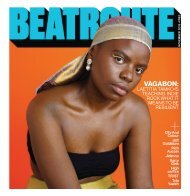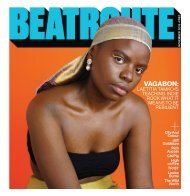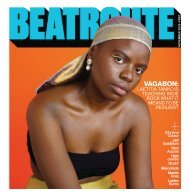BeatRoute Magazine AB Edition - December 2019
BeatRoute Magazine is a music monthly and website that also covers: fashion, film, travel, liquor and cannabis all through the lens of a music fan. Distributed in British Columbia and Alberta, and Ontario edition. BeatRoute’s Alberta edition is distributed in Calgary, Edmonton, Banff and Canmore. The BC edition is distributed in Vancouver, Victoria and Nanaimo. BeatRoute (AB) Mission PO 23045 Calgary, AB T2S 3A8 E. editor@beatroute.ca BeatRoute (BC) #202 – 2405 E Hastings Vancouver, BC V5K 1Y8 P. 778-888-1120
BeatRoute Magazine is a music monthly and website that also covers: fashion, film, travel, liquor and cannabis all through the lens of a music fan. Distributed in British Columbia and Alberta, and Ontario edition. BeatRoute’s Alberta edition is distributed in Calgary, Edmonton, Banff and Canmore. The BC edition is distributed in Vancouver, Victoria and Nanaimo. BeatRoute (AB) Mission PO 23045 Calgary, AB T2S 3A8 E. editor@beatroute.ca BeatRoute (BC) #202 – 2405 E Hastings Vancouver, BC V5K 1Y8 P. 778-888-1120
Create successful ePaper yourself
Turn your PDF publications into a flip-book with our unique Google optimized e-Paper software.
BEATROUTE
TOP 10 ARTISTS OF THE DECADE
Queer Icon of the Decade
6Nº
FRANK
OCEAN
W
hen Frank Ocean’s heartfelt letter surfaced on Tumblr in 2012, the mainstream
media’s expectations for a Black queer revolution were heavily misguided.
The act of saying “I’m gay” for any black person is packed with nuance and an
inherent fear that looms within our history and cultural norms. Some of the hardest
lessons and personal milestones that come with Black queerness are achieved in a
state of deep reflection and solace, not in the limelight for everyone to critique.
Seven years on, Ocean’s queer awakening is still a beautiful act of self-care. His
journey has taught us that as we continue to navigate queerness in the real world,
we need to explore the ideas around the traditional “coming out” story and ask why
this is still the most coveted form of disclosure.
Frank teased about unrequited love on his debut album, Channel Orange, without giving that love a
face. His approach allowed him to freely explore artistry without the toxic pressures of Black masculinity.
The announcement of his first love with a man was an act of power and liberation in the wake
of the album’s success. Le1f and Mykki Blanco were beginning to cement their legacy, while fighting
the painfully reductive label of “gay rapper.” It’s a blessing and a curse to be recognized solely based
on your identity, especially as a Black person.
Knowing the soft, elusive nature of Ocean’s music made it no shock to me that after his Tumblr
post he retreated back to his other first love and kept his secrets in his songs. Moving in silence is
transcendent and deeply inspiring when looking at Ocean’s accomplishments. Blonde arrived as we
watched Ocean become more comfortable in his skin. He sings “Here’s to the gay bar you took me
to” on “Good Guy”—a nod to those mementos in life that shape your queerness.
The label doesn’t add value to the struggle; the visibility doesn’t validate the journey. Black queerness
is entering a new era where folks get to steer their own ships without labels and without fear.
We’re learning that self-love is the best medicine, and that our glow-up doesn’t need to be fodder for
an inclusivity contest. Ocean’s model for queer awakening has been a great tool to reference. I feel
lucky to live in a time where I can learn what version of “out and proud” works for me.
To quote a recent meme, when we talk about “coming out” in the next 20 years, I’ll look to Frank
Ocean’s journey and I’m gonna tell the kids THIS was the Black queer revolution. ,
By MAX MOHENU
7Nº
Biggest First-Week Sales
Adele
T
he music industry underwent huge changes this decade.
Pop artists repackaged themselves to suit marketing
campaigns in hopes that it would keep album sales from
tanking further. And then there was Adele and her her
own, bold strategy: she let the music speak for itself.
Her 2008 debut album, 19, earned her two Grammy Awards and, in 2011,
Adele secured her legendary status when her sophomore LP, 21, became a
runaway hit.
An album of heartsick ballads like “Someone Like You,” and breakup songs
like “Rolling in the Deep,” 21 won Adele numerous awards including six Grammys
and made Billboard chart history as the first solo female artist to have
three singles simultaneously in the Top 10.
The accolades are staggering, even more so when you consider that her
albums’ numbers correspond with her age at the time she recorded them.
Three years after the release of 21, at 24-years-old, Adele Adkins became
the mononymous Adele, and one of the world’s highest-paid celebrities under
30.
There’s a timelessness to Adele. In many ways, she is a throwback to another
era, from her stripped down live performances, to her vintage-inspired
style. Her singing voice is sometimes bluegrassy, sometimes soulful, but
always powerful.
By 2014, she had added Oscar winner to her resume for her Bond film
anthem, “Skyfall.” But, in 2015, four years after 21’s release, she worried the
world might have moved on in her absence.
On its first day, 25 sold over a million copies in the U.S. By the end of its
first week it had broken sales records worldwide. 25 cleaned up at the Grammys
and Brit Awards and broke chart records, surpassing Madonna. Most
notably, in the age of streaming, people were buying CDs and LPs.
In a time of difference and disconnect, Adele’s contributions to music this
decade are undeniable: she brought feelings back into the equation. ,
By LAUREN DONNELLY
14 BEATROUTE DECEMBER 2019

















